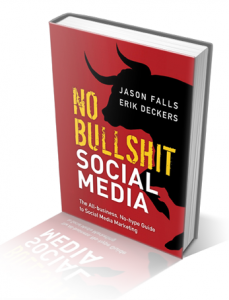“We don’t do social media, because people might say bad things about us,” the executive said. “If we have a Facebook page, people might leave negative comments on it.”
“They’re already saying bad things about you,” I said. “Whether you’re on it or not, people are complaining about you, and they’re telling as many of their friends as they can.”
The rest of the conversation went as expected. Reason after reason. Excuse after excuse. We’re not on social media because. . . we don’t do social media because we. . . it’s only for young people. . .
In No Bullshit Social Media, we listed 28 different reasons companies are afraid of using social media: no money, no experience, no guaranteed results, we’ve never done it that way before, yada yada yada.
There are any number of reasons why companies are afraid, and there are only a few reasons why they shouldn’t be. But these reasons trump all the excuses any business can ever come up with.
1) Social media is not going away. It’s not a fad. It’s not something we’ll forget about. Social media has been brewing for the last 30 years, when Compuserve and Prodigy started as community bulletin boards. Or even before that when real computer bulletin boards were introduced in the 1970s. Companies may come and go, but real-time communication isn’t going anywhere.
2) Social media has gained wide acceptance faster than any other medium. It took radio 38 years to reach 50 million listeners; television took 13 years to get 50 million viewers. Facebook, on the other hand, added 100 million users in 9 months. Social media is only going to grow and get a stronger foothold in the way we communicate and receive information and news.
3) Social media is inexpensive. Facebook is free, Twitter is free, blogging is free, assuming you’ve got the time and knowledge to use it. If you don’t, you can hire people to manage it for you. It’s no different from hiring in-house or outsourced professionals to manage your TV ads, your websites, and your trade shows. The only difference is once you hire social media people, your overhead is mostly finished; the tools don’t cost anything to operate.
If you hire someone to produce your TV ads, there’s still the costs of actually creating them, and then buying the airtime. You can hire people to manage your trade shows, but you still have to pay the added costs of booth space and rentals, going there, working it, and coming home. Plus expenses.
4) Social media marketing can be measured. One big difference between social media marketing and regular marketing is that we can measure social media marketing through tools like Google Analytics and SocialMention.com (both free) and Radian6 and Vocus (both paid services).
How do you measure a billboard? How do you know how many people drove by, read it, and bought your product? How do you measure a TV commercial? How do you know how many people actually sat through the entire commercial and bought as a direct result? How many walked away after 20 seconds? 10 seconds? How many people never even saw it because they changed the channels?
With social media, we can tell who read a blog post, clicked a link, and then made a purchase. Mainstream media can give you estimates and guesses, but they can’t actually count. Social media can tell you how long someone watched a video or visited a website, when they clicked away, and where they went. Mainstream media can only guess at the numbers of viewers, listeners, and readers.
Social media marketing isn’t going away. And while it seems like everybody is using it, there are still hundreds of thousands of businesses that haven’t even considered it. It’s not too late to start. It’s not too late to create a Twitter account or a blog, and then talk directly to, and hear directly from, your customers. There’s nothing to be afraid of, and there are plenty of people to help you get through the rough spots.
Erik Deckers is the co-author of Branding Yourself: Using Social Media to Invent or Reinvent Yourself, and most recently, the co-author of No Bullshit Social Media: The All-Business, No-Hype Guide to Social Media Marketing. He is co-owner of Professional Blog Service, a ghost blogging and social media consulting agency in Indianapolis.
